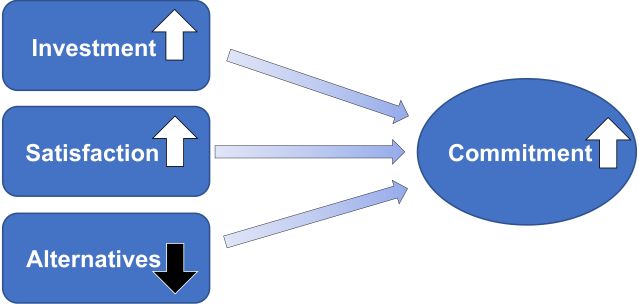OCD
The Impact of Relationship OCD on Relationship Commitment
How ROCD impacts relationship commitment and how to cope with it.
Posted May 6, 2023 Reviewed by Vanessa Lancaster
Key points
- Relationship commitment is influenced by investment, satisfaction, and perceived alternatives.
- ROCD decreases relationship investment and satisfaction and increases preoccupation with alternatives, diminishing relationship commitment.
- Investment can aid individuals in maximizing the full potential of their relationship, empowering them to make informed relationship choices.
Relationship OCD (ROCD) is a type of obsessive-compulsive disorder (OCD) in which one’s relationship becomes the focus of obsessions and compulsions. Individuals with ROCD constantly question the suitability of their relationship or partner and spend a substantial amount of time and energy in continuous attempts to alleviate their doubts and gain a sense of certainty regarding the rightness of their relationship (Doron et al., 2014).
ROCD symptoms have been associated with depression, relationship-related distress, and negative effects on one's partner (Doron et al., 2012a; Fernandez et al., 2021; Littman et al., 2023; Mısırlı & Kayanak, 2023). Additionally, ROCD may also have a detrimental effect on one’s relationship-related commitment. To gain insight into this impact and ways to mitigate it, let’s first explore the elements that contribute to relationship commitment.
What constitutes relationship commitment?
Rusbult et al. (1998) defined relationship-related commitment as intent to persist in a relationship, including long-term orientation towards involvement as well as feelings of psychological attachment. Rusbult and colleagues described three main components that impact one’s level of relationship-related commitment:
- Investment size refers to the magnitude and importance of the resources one puts into the relationship.
- Satisfaction level refers to the positive versus negative emotions experienced in a relationship. Satisfaction is influenced by the extent to which one’s needs are fulfilled in their relationship.
- Perceived quality of alternatives refers to the extent to which one believes that their needs could be fulfilled outside of their current relationship or the extent to which they perceive that they have other viable options for a fulfilling relationship1.
Rusbult et al.'s model suggests that as a person invests more in their relationship, becomes more satisfied with it, and is less preoccupied with the possibility of alternatives, their commitment to the relationship increases. Unfortunately, ROCD significantly impacts each of the model’s three components (Doron & Derby, 2017).

ROCD and Relationship Commitment
Let us explore the ways in which ROCD impacts the three elements that influence one’s relationship commitment.
ROCD and Investment Size
ROCD can have a significant impact on one’s level of investment in their relationship. Those with ROCD may struggle to invest in a relationship they are uncertain about. Often in therapy sessions, I hear clients express their fears that investing in their relationship might give their partner the wrong impression about their readiness to commit or even be immoral by misleading their partner. The outcome of such worries is often reduced investment in the relationship.
ROCD and Satisfaction Level
ROCD symptoms were shown to be correlated with reduced relationship satisfaction (Doron et al., 2012a, 2012b; Kılıç & Altınok, 2021). The ongoing occupation with relationship-related doubts and deliberations often leaves individuals feeling trapped ‘inside their heads,’ meaning they mostly experience their doubts and fears rather than the relationship itself. They tend to focus on finding signs that they are or aren’t in the right relationship, which takes away from their ability to be present and fully engaged in the relationship.
In addition, investment size and satisfaction level hold a reciprocal relationship. Doubts about the suitability of one’s relationship can lead to reduced investment, as individuals may question why they should invest in a relationship they are uncertain about. As a result, the relationship becomes less compelling, and satisfaction decreases, reinforcing the perception that the relationship is unfulfilling and unsuitable, which further reduces one’s investment. This creates a ROCD cycle of reduced investment and satisfaction, ultimately impacting the overall relationship commitment.
ROCD and Perceived Quality of Alternatives
People with ROCD are often preoccupied with the fear of missing out on a ‘better’ relationship and being trapped in the ‘wrong’ one, which leads to increased preoccupation with the possibility of alternative partners. Hence, they tend to be attentive to potential alternative partners and notice desirable attributes in those around them. Encountering physically attractive, witty, or socially desirable people, either in real life or on social media and in movies, may easily trigger these fears, leading individuals with ROCD to consider that they may be happier with someone else.
At times, narrow, specific elements such as people’s photos, tweets, and statuses may trigger one’s relationship-related doubts (e.g., “This girl’s tweet is so witty… while my partner doesn’t sound as witty in her tweets… perhaps I’d be happier with this girl”). The persistent preoccupation with the plausibility of alternative partners reinforces the belief that something better might be out there, preventing individuals with ROCD from being fully present in their current relationship.

Investment Is Key
The little prince went away to look again at the roses. "You are not at all like my rose" he said. "To be sure, an ordinary passer-by would think that my rose looked just like you. But in herself alone, she is more important than all the hundreds of you other roses: because it is she that I have watered.. because it is she that I have sheltered.. because it is she that I have listened to when she grumbled or boasted, or even sometimes when she said nothing. Because she is my rose." – The Little Prince, Antoine de Saint-Exupéry.
Let's use a garden as an analogy for a relationship. It will likely wither away if you neglect to water, clean, and care for your garden. Then, you may be tempted to think, "What's the point? This garden is already withered." However, in this case, you haven't given your garden a fair chance to thrive.
The more you invest in your garden and the more time and effort you dedicate to it, the more you'll appreciate its full potential. This doesn't necessarily mean that your garden will bloom exactly how you want it to, but you'll witness how it could flourish when given proper attention and care.
Like gardens, relationships require care and attention to flourish. Without investment, a relationship can wither away and become unfulfilling. But just like a garden, with proper nurture and care, a relationship can thrive and reach its full potential, its rewards can become more apparent, and the investment becomes more compelling.
In the clinic, clients with ROCD often struggle to invest in a relationship when uncertain about it. They believe they need to be certain about their relationship before investing in it. However, I usually recommend flipping this mindset. Investing in your relationship first can lead to a better understanding of its true potential, which can then help you evaluate it with clarity.
Investing in one's relationship doesn't necessarily require grand gestures or extravagance. Simple acts of love and kindness, such as expressing affection through words, spending quality time together, performing small acts of care and thoughtfulness, actively listening to your partner, and planning mutual activities, are all great ways to nurture and invest in your relationship.
Importantly, when one commits to investing in their relationship, the level of investment should not be determined by one’s doubts, deliberations, or distressing feelings. In fact, people with ROCD are likely to experience such doubts and distressing feelings as they invest in their relationship. But to start breaking the vicious ROCD cycle, one should focus on investing in their relationship rather than on their ever-changing doubts and feelings. In doing so, one will become more able to witness their relationship in its full bloom.
Effective treatment of ROCD is a powerful tool for individuals struggling with the distressing impact of doubts and deliberations on their relationships. By investing and being present in your relationship, you can begin to break free from the cycle of uncertainty and gain a sense of clarity and empowerment in making informed choices about the future of your relationship.
To know more about Relationship OCD, click here.
References
1 Rusbult's model of relationship commitment is primarily focused on monogamous relationships. Alternative models might be more suitable for illustrating the dynamics of other types of relationships.
Doron, G., & Derby, D. (2017). Assessment and Treatment of Relationship‐Related OCD Symptoms (ROCD) A Modular Approach. The Wiley handbook of obsessive compulsive disorders, 1, 547–564.
Doron, G., Derby, D. S., Szepsenwol, O., & Talmor, D. (2012a). Tainted love: Exploring relationship-centered obsessive compulsive symptoms in two non-clinical cohorts. Journal of Obsessive-Compulsive and Related Disorders, 1(1), 16–24.
Doron, G., Derby, D. S., Szepsenwol, O., & Talmor, D. (2012b). Flaws and all: Exploring partner-focused obsessive-compulsive symptoms. Journal of Obsessive-Compulsive and Related Disorders, 1(4), 234–243.
Doron, G., Mizrahi, M., Szepsenwol, O., & Derby, D. (2014). Right or flawed: Relationship obsessions and sexual satisfaction. The Journal of Sexual Medicine, 11(9), 2218–2224.
Fernandez, S., Sevil, C., & Moulding, R. (2021). Feared self and dimensions of obsessive compulsive symptoms: Sexual orientation-obsessions, relationship obsessions, and general OCD symptoms. Journal of Obsessive-Compulsive and Related Disorders, 28, 100608.
Kılıç, N., & Altınok, A. (2021). Obsession and relationship satisfaction through the lens of jealousy and rumination. Personality and Individual Differences, 179, 110959.
Littman, R., Leibovits, G., Halfon, C., Schonbach, M., & Doron, G. (2023). Interpersonal transmission of ROCD symptoms and susceptibility to infidelity in romantic relationships. Journal of Obsessive-compulsive and Related Disorders, 37, 100802.
Mısırlı, M., & Kayanak, G. K. (2023). Relationship Obsessive Compulsive Disorder: A Systematic Review. Current Approaches in Psychiatry, 15(4), 549–561.
Rusbult, C. E., Martz, J. M., & Agnew, C. R. (1998). The investment model scale: Measuring commitment level, satisfaction level, quality of alternatives, and investment size. Personal relationships, 5(4), 357–387.




